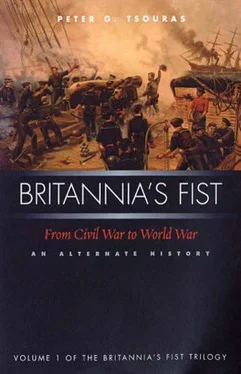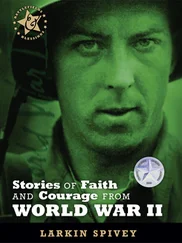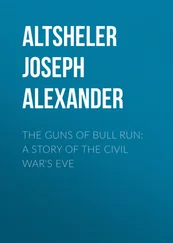Peter Tsouras - Britannia's Fist - From Civil War to World War
Здесь есть возможность читать онлайн «Peter Tsouras - Britannia's Fist - From Civil War to World War» весь текст электронной книги совершенно бесплатно (целиком полную версию без сокращений). В некоторых случаях можно слушать аудио, скачать через торрент в формате fb2 и присутствует краткое содержание. Год выпуска: 2008, ISBN: 2008, Издательство: Potomac Books Inc., Жанр: Альтернативная история, на английском языке. Описание произведения, (предисловие) а так же отзывы посетителей доступны на портале библиотеки ЛибКат.
- Название:Britannia's Fist: From Civil War to World War
- Автор:
- Издательство:Potomac Books Inc.
- Жанр:
- Год:2008
- ISBN:9781574888232
- Рейтинг книги:3 / 5. Голосов: 1
-
Избранное:Добавить в избранное
- Отзывы:
-
Ваша оценка:
- 60
- 1
- 2
- 3
- 4
- 5
Britannia's Fist: From Civil War to World War: краткое содержание, описание и аннотация
Предлагаем к чтению аннотацию, описание, краткое содержание или предисловие (зависит от того, что написал сам автор книги «Britannia's Fist: From Civil War to World War»). Если вы не нашли необходимую информацию о книге — напишите в комментариях, мы постараемся отыскать её.
Britannia's Fist: From Civil War to World War — читать онлайн бесплатно полную книгу (весь текст) целиком
Ниже представлен текст книги, разбитый по страницам. Система сохранения места последней прочитанной страницы, позволяет с удобством читать онлайн бесплатно книгу «Britannia's Fist: From Civil War to World War», без необходимости каждый раз заново искать на чём Вы остановились. Поставьте закладку, и сможете в любой момент перейти на страницу, на которой закончили чтение.
Интервал:
Закладка:
Peter G. Tsouras
Britannia's Fist: From Civil War to World War
1
KAMERINSKI WOODS, OUTSIDE LODZ, POLAND, JULY 12, 1863
The sweat ran down his face as he lay hidden in the cool Polish forest. Jan Szmanda’s heart pounded as he aimed his musket at the cavalry patrol wending its way along the narrow woodworkers’ road. There were fifteen Cossacks, their lances bobbing with the canter, and an officer who rode at their head, his whip dangling from its loop around his wrist. He was the same one who had “pacified” the three surrounding villages and left them filled with corpses dangling from the trees. “God save Poland,” Jan prayed.
“Wait…wait…wait,” he told himself. He chose the officer as his target and waited, waited. The seconds seemed like hours, then CRACK, the first shot broke the silence of the woods. The officer lurched in his saddle, and Jan’s finger pulled the trigger as did twenty other Poles. Unfortunately, almost everyone had aimed at the officer, the result of amateurs at war. Man and horse sprayed blood as they thrashed into the trees.
The Cossack sergeant had seen this twenty years before in the forests of Chechnya and had not forgotten its lessons. “Into the woods, my children!” he shouted as they lowered their lances, and he spurred his horse into the trees still shrouded by the black powder smoke. They had practiced this often, these men who fought the border wars of the empire. Their nimble horses dashed through the spaced trees of this well-tended estate forest. Jan saw them come as he frantically tried to reload, but it was too late. The beast was upon him as he cast away the rifle and fled. He dodged among the trees with the quickness of his seventeen years, but the Cossack’s pony was swifter as it followed. The sergeant could see his prey glancing back wide-eyed with terror as the distance closed. Then with a move he had practiced a thousand times and executed for real too many times to count, he picked the spot on the boy’s back just below the left shoulder blade, low enough to miss it and high enough to avoid the ribs. He leaned forward in the saddle, his boots pressing into the stirrups to cushion the blow and channel the shock through the horse to the ground. Jan looked back one last time and shrieked. Just then the Cossack struck, driving the lance’s point through the boy’s back and into his heart. He choked on a scream as his body ran forward a pace or two on its own momentum, and the Cossack jerked out the point in a deft move. He passed the corpse as it went tumbling head over heels into the leaves.
It was over in ten minutes. Thirteen dead Poles and against one Cossack officer-a bad trade, the sergeant thought, if one didn’t take into account what a prick Lieutenant Golitsyn had been, but he was thankful it was not Chechens that had sprung the ambush. Those bastards knew what they were about. No Chechen would have flinched from a one-on-one fight with even a mounted Cossack-not like these Polish amateurs in revolt against their God-anointed ruler, the Czar Emperor Alexander II.
Yes, God save Poland, save it from its geography and its pride. It was the pride of this people that kept them hung on this Russian cross. Had they given up their pride and settled for assimilation and Russianization, boys like Jan would still be alive, albeit with a cringe in his bearing.
As the blood of the Napoleonic Wars dried thirty-five years before, the victors apportioned the thrones of Europe. Napoleon III had toyed with the re-creation of the Polish state as an ally. The victors did him better. They re-created the kingdom of Poland and then threw it to the wolf in the Kremlin, awarding its crown to the Russian Czar to add to his collection of crowns. The heavy Russian hand finally provoked a widespread revolt in January that by July was in its failed last stage.
ORPHAN ASYLUM FOR COLORED CHILDREN, FIFTH AVENUE AND FORTY-THIRD STREET, NEW YORK, JULY 13, 1863
Bricks shattered the ground-floor windows, and the large double door thudded with the blows of clubs. Outside the mob howled like a blood-drunk beast. “Burn the nigger nest!” was the shout that turned into a chant, a chant with a distinct Celtic lilt, at that. Inside the asylum the white matron coolly organized the evacuation out the back doors of her 237 young wards, all younger than the age of twelve. Her Negro handyman, old gray-haired Willie Washington, stood back from the doors, a fire ax at the ready.
The city was in the grip of a riot. The reading of the draft draw had been a match thrown into kerosene. It was hugely unpopular among the working classes of New York, especially the mass of Irish immigrants who competed with free blacks for the bottom rung of the economic ladder. A hot, sticky July had settled on the city, feeding the discontent. Gangs appeared on the streets in the morning. A single pistol shot was fired in the crowded offices of the District Draft Office on Third Avenue and Forty-Sixth Street. The police guard was barely able to get the draft officials out of the building before it went up in flames.
Rushing to the scene, Police Commissioner John Kennedy was set upon by the rioters and clubbed to the ground. He staggered to his feet and tried to run, but the mob brought him down for another beating. The mobs grew like a fire racing through dry tinder and came across a detachment of soldiers from the Invalid Corps, men too incapacitated by their wounds to serve in the field. Surprised, the troops got off a ragged volley that only enraged the rioters who surged over the soldiers, killing two and wounding fifteen.
Guided by more than instinct, the mob surged to the Armory at Second Avenue and Twenty-First Street. The police defense collapsed after an hour and a half. Now the mob was armed as it left the Armory also in flames. Leaders appeared who sported the cutout of the Indian head of a penny on their lapels, egging the rioters on and pointing out new targets for their wrath. The mobs were spreading like a cancer throughout the city now, aiming a special wrath at Negroes. As fire licked the Armory roof, the Orphan Asylum drew another mob. 1
As the last of her wards disappeared through the back gate, the matron went back into the building to tell Willie he could abandon his post. Too late, she saw the door splinter apart and its fragments swing back on their hinges. The old man had straightened his bent back and flew into the crowd as it burst in, his ax arched over his head to sink into the face of the first man through. Blood gushed over the crowd as Willie wrenched the ax free. He did not get a second swing as the pack fell on him.
OUTSKIRTS OF CINCINNATI, OHIO, NIGHT OF JULY 13–14, 1863
Utter exhaustion gripped the remnants of the brigade as it staggered forward into the night, its way lit by torches wrapped with looted calico. So bone weary were man and beast that the cavalrymen sought out in the torchlight the path of those gone before from the spattered lather that dripped from their horses’ mouths.
No Confederate force had ever penetrated so far into Yankeedom as the cavalry rode around the Ohio metropolis, too tired now to think of taking it. Col. John Hunt Morgan’s foray into the north had been his own initiative. He had not bothered to inform his commander, Lt. Gen. Braxton Bragg, commanding the Army of Tennessee. Morgan’s fame had grown from his raider’s instincts and flair for leadership, qualities that chaffed under Bragg’s limp hand.
Morgan had left a trail of burned railroad bridges and factories, looted homes and stores, plundered payrolls, and roused state governments in Indiana and Ohio. Morgan’s leadership talents had not extended to the discipline of his men, who went on an uncontrollable rampage as they rode through southeastern Indiana. Capt. Henry Thomas Hines, one of his most intrepid company commanders, was beside himself in anger at this thoughtless display. Lithe and dark-haired, barely 130 pounds, the daring young Hines had more than once been likened to the rising star of the famous Booth family of actors, John Wilkes Booth. Looks aside, Hines had far better control of his emotions than the tempestuous actor. He had to swallow his dismay that Morgan was casting away the very allies he had sought to find among the disloyal elements in these states. He had returned from a June foray in the region and sought out the leaders of this movement and been promised their willing support.
Читать дальшеИнтервал:
Закладка:
Похожие книги на «Britannia's Fist: From Civil War to World War»
Представляем Вашему вниманию похожие книги на «Britannia's Fist: From Civil War to World War» списком для выбора. Мы отобрали схожую по названию и смыслу литературу в надежде предоставить читателям больше вариантов отыскать новые, интересные, ещё непрочитанные произведения.
Обсуждение, отзывы о книге «Britannia's Fist: From Civil War to World War» и просто собственные мнения читателей. Оставьте ваши комментарии, напишите, что Вы думаете о произведении, его смысле или главных героях. Укажите что конкретно понравилось, а что нет, и почему Вы так считаете.












